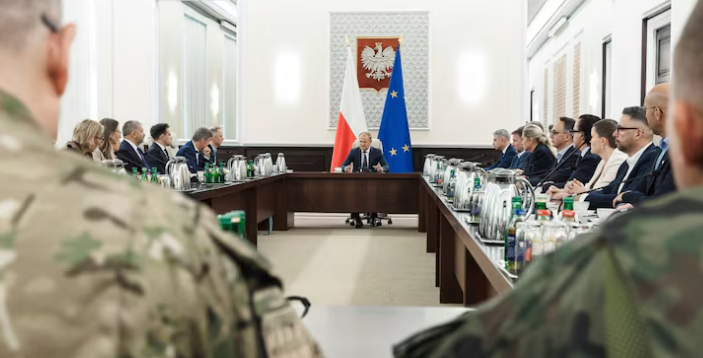Best Free Resources for Traders in 2025: From Charts to AI Alerts
December 01 , 2025

Poland invokes NATO Article 4 after Russian drones enter its airspace, triggering alliance consultations. Learn what Article 4 and 5 mean, how Poland responded, and what comes next in this high-stakes escalation.
On the night of September 9–10, 2025, Poland faced an unprecedented violation of its airspace. Multiple Russian drones crossed into eastern Poland, prompting the country to shoot down several of them. The incident, seen as the most serious airspace breach since the war began, led Poland to formally invoke NATO Article 4. With NATO allies convening in emergency consultations, the stakes now extend far beyond Poland’s borders.
NATO’s founding treaty includes Article 4, which allows any member country to demand consultations with allies when it believes its territorial integrity, political independence, or security is threatened. Unlike Article 5, which is the alliance’s core collective defense clause, Article 4 does not automatically trigger military responses—it activates diplomatic and strategic dialogue among NATO nations. :contentReference[oaicite:0]{index=0}
Article 5 obligates NATO members to respond collectively if one of them is attacked; it has only been invoked once—after the September 11, 2001 attacks. In contrast, Article 4 is a softer but significant tool: it’s often the first step toward alliance-wide consultation before moving toward any action. :contentReference[oaicite:1]{index=1}
Throughout the night, up to 19 drones violated Polish airspace during a massive Russian drone and missile attack on Ukraine. Polish forces, with support from Dutch and other NATO jets, intercepted and shot down several of the drones. At least one residential building was damaged, though no casualties were reported. :contentReference[oaicite:2]{index=2}
Prime Minister Donald Tusk described the breaches as a “large-scale provocation,” saying that Poland had never been closer to open conflict since World War II. As a result, Poland activated Article 4 of the NATO treaty, prompting consultations under the North Atlantic Council. :contentReference[oaicite:3]{index=3}
For Poland, this was more than an airspace violation—it was a security threat from a strategic rival. By invoking Article 4, Poland sought formal solidarity from NATO allies, and to coordinate measures to deter future incursions. The move underscores how drone strikes—even without casualties—can escalate tensions and demand collective responses. :contentReference[oaicite:4]{index=4}
From Russia’s perspective, these drone incursions may be part of a broader strategic test—probing NATO’s readiness and response. Invading Polish airspace, even unintentionally, risks unintended escalation. With tensions already high due to Moscow’s war in Ukraine, the incident further tests the unity and strategic posture of NATO. :contentReference[oaicite:5]{index=5}
NATO Secretary General and alliance leaders swiftly condemned the violation. NATO raised its alert levels, scrambled fighters, and elevated surveillance. Consultations under Article 4 are now underway, with a focus on bolstering eastern defenses and preventing future drone intrusions. :contentReference[oaicite:6]{index=6}
Polish Prime Minister Donald Tusk responded with urgency. Upon learning of the incursion, he mobilized national defense, raised diplomatic alarms, and formally requested NATO consultations. In parliament, he warned that Poland is at its closest point to open conflict since WWII. :contentReference[oaicite:7]{index=7}
While Article 4 consultation doesn’t guarantee military action, it signals that NATO members are taking these incursions seriously. Potential outcomes include enhanced air defense in eastern NATO countries, intelligence-sharing upgrades, or expanded joint military exercises. If future incursions escalate, the step toward Article 5 cannot be ruled out—but for now, Article 4 provides a diplomatic safety valve. :contentReference[oaicite:8]{index=8}
By invoking Article 4, Poland has signaled to Russia and the world that NATO is not passive in the face of airspace breaches—even from drones. Though this remains a diplomatic process rather than a military one, the message is clear: NATO stands ready to consult, coordinate, and defend. In the volatile environment shaped by Putin’s aggressive moves, consultations under Article 4 offer a critical first line of defense and alliance unity.
#NATOArticle4 #PolandInvokesArticle4 #RussianDroneIncursion #NATOvsRussia #PolandAirspaceViolation #Article5Discussion #PutinProvocation #DonaldTuskResponse #SecurityThreatPoland #NATOUnity